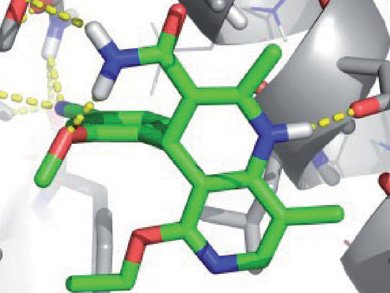Chronic heart failure (CHF) is a disease that puts a heavy burden not only on patients, but also on healthcare resources. A validated treatment for CHF is blockade of the mineralocorticoid receptor (MR), but currently available MR antagonists suffer from two substantial drawbacks that limit their benefit in the clinic: lack of selectivity (in the case of spironolactone) and limited efficacy (in the case of eplerenone).
Lars Bärfacker and colleagues, Bayer Research Center in Wuppertal, Germany, revealed a novel series of non-steroidal MR antagonists based on a 1,4-dihydropyiridine scaffold. The authors provide a detailed structure–activity relationship as well as insight into the underlying pharmacophore model.
Their work has culminated in the identification of BAY 94-8862, a potent non-steroidal MR antagonist with outstanding selectivity. BAY 94-8862 is currently in phase II clinical trials for the treatment of CHF patients with renal impairment.
- Discovery of BAY 94-8862: A Nonsteroidal Antagonist of the Mineralocorticoid Receptor for the Treatment of Cardiorenal Diseases,
L. Bärfacker, A. Kuhl, A. Hillisch, R. Grosser, S. Figueroa-Pérez, H. Heckroth, A. Nitsche, J.-K. Ergüden, H. Gielen-Haertwig, K.-H. Schlemmer, J. Mittendorf, H. Paulsen, J. Platzek, P. Kolkhof,
ChemMedChem 2012, 7(08).
DOI: 10.1002/cmdc.201200081




